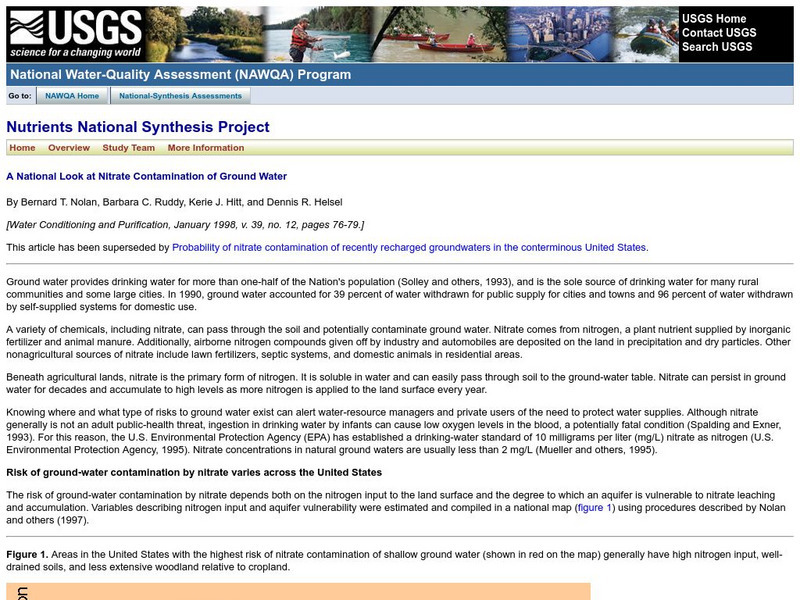US Geological Survey
U.s. Geological Survey: What Is Ground Water?
This report from the U.S. Geological Survey uses illustrations to show how water moves through an aquifier and also how water is obtained from the ground.
US Geological Survey
Usgs: The Water Cycle
Learn about the movement of water from Earth's surface to the atmosphere with this site. Site describes the water cycle in words and with a diagram. Also explored on the page is the distribution of Earth's global water supply.
US Environmental Protection Agency
Epa: Surf Your Watershed
This resource provides information on watersheds, maps, activities, and links to local watershed information.
US Geological Survey
U.s. Geological Survey: Search
The U.S. Geological Survey offers information for teachers and students interested on Earth Science research. Contains references to general information as well as current research and events.
US Geological Survey
Usgs: Earth's Water Surface Water
This site has everything you might want to know about surface water and things you probably didn't even imagine! Click Home to access the site in Spanish.
Harvard University
Arsenic Contamination of Ground Water in Bangladesh
This site talks about related problems to groundwater contamination in Bangladesh and the challenges that face the people there.
University Corporation for Atmospheric Research
Ucar: The Water Cycle
This site provides a comprehensive introduction to the water cycle. Students construct a model to simulate parts of the water cycle. Includes background information, links to standards, lesson plans, and assessment ideas.
US Geological Survey
Usgs: How Much Water Is There on (And In) the Earth?
The USGS gives an overview of the amount of water on Earth and where it is located. It gives a few interesting facts about the Earth's supply of water. Click Home to access the site in Spanish.
Center for Educational Technologies
Earth Science Explorer: The Water Cycle
This is a very brief overview of the water cycle, but it does have a nice graphical representation.
US Geological Survey
Usgs: A National Look at Nitrate Contamination of Ground Water
This site features a map of the United States which indicates areas with the highest risk of nitrate contamination in ground water. Links to a description of ground water contamination in U.S.
US Geological Survey
Usgs: Effects of Human Activities
This site reviews the effects of agricultural development, urban and industrial development, drainage of the land surface, modifications to river valleys, and modifications to the atmosphere have on ground water and surface water.
Cosmo Learning
Cosmo Learning: Water Resources Engineering
A collection of video lectures from a course on water resources engineering. Webpage includes twenty-eight lectures from a professor at the National Programme on Technology Enhanced Learning. Lectures vary in length and cover topics like...
US Environmental Protection Agency
Epa: Where Does Your Water Come From? [Pdf]
Where does your drinking water come from? This resource features a clear and concise explanation for this question. This resource will be beneficial to students and teachers.
US Environmental Protection Agency
Epa: The Water Cycle [Pdf]
An illustrated diagram of the water cycle that students can use for study.
Michigan Reach Out
Reach Out Michigan!: Contaminated Drinking Water
This site is provided for by Reach Out Michigan! Use the site to learn if our eyes and taste buds can detect contaminated drinking water by doing a simple experiment.
PBS
Pbs Teachers: Water Use: Tragedy in the Owens River Valley
Map the geographical area of a watershed, evaluate watershed use and describe land use practices of the people within one. Investigate the events surrounding the war over the Owens River in California at the turn of the 20th century.
Other
Groundwater in Idaho: Aquifers
This resource outlines what an aquifer is, the types of aquifers, and aquifer categorization. It also provides additional information for further study.
Geography 4 kids
Geography4 kids.com: Where Is Groundwater?
Critical source of freshwater and most abundant, yet also the most polluted is groundwater. Discover how scientists work to purify this important resource to make it useable.
Geography 4 kids
Geography4 kids.com: Using Groundwater
Of course humans rely on freshwater for drinking and washing, but we also need it in great quantities to water crops and livestock for the food we consume. Understand the systems in place to purify and store groundwater to do this.
ClassFlow
Class Flow: Water Cycle
[Free Registration/Login Required] This is a science flipchart that reviews the stages of the water cycle and also ways in which the water cycle affects weather such as hurricanes and tornadoes.
ClassFlow
Class Flow: The Water Cycle
[Free Registration/Login Required] This lesson covers information for middle grade students relative to the basic functions of the water cycle.








![Epa: Where Does Your Water Come From? [Pdf] Lesson Plan Epa: Where Does Your Water Come From? [Pdf] Lesson Plan](https://content.lessonplanet.com/knovation/original/41160-83ff7c05b0f0460206fa551d2700d8dc.jpg?1661270414)
![Epa: The Water Cycle [Pdf] Graphic Epa: The Water Cycle [Pdf] Graphic](https://content.lessonplanet.com/knovation/original/42176-ac4345d9392f3783430ed3628fd17cec.jpg?1661261553)






